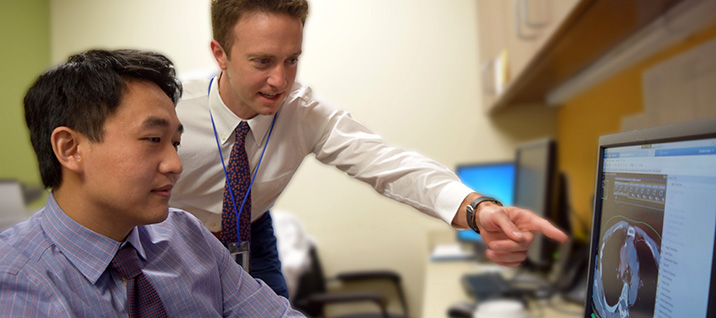Richard Cassidy, MD, and fellow senior residents Jim Zhong, MD, and Jaymin Jhaveri, MD, offer some advice to the incoming interns that will join the department in July 2019.

May 8, 2018
"It's time to get serious."
This is the advice Richard Cassidy, MD, received from a former chief resident when he first started as an intern in Winship's Department of Radiation Oncology in 2013.
Winship residents work alongside medical experts dedicated to pioneering new ways to prevent, diagnose, and treat cancer. According to residency director Pretesh Patel, MD, "Residents are actively engaged in helping us to develop the most effective treatments for our cancer patients and integrate them in the clinic." He says they are expected to keep on pace with the collaborative, constantly evolving nature of cancer research and patient care.
This spring, four recently graduated medical students matched with the Department of Radiation Oncology. They will join the department in July 2019 following a one-year medical internship. Cassidy and fellow senior residents Jim Zhong, MD, and Jaymin Jhaveri, MD, offer some advice to the incoming interns.
"Set yourself up for how you are going to act for the rest of your career as a physician," says Cassidy. "Be prepared, on time, and ready to learn." A resident's schedule includes daily rotations, presentations, and being on call for emergency medicine. While strenuous, always being prepared alleviates pressure. "Every ounce of preparation pays off many times over in outcomes."
Zhong, who has accepted a faculty position at Emory, encourages residents to be as open-minded as possible to all experiences. "Appreciate the differences among your colleagues and the people you work with because everyone brings something different and valuable to each discussion." Residents have the opportunity to work with many different faculty as they complete their varying rotations.
Jhaveri says the best thing that a resident can do is to "focus on being efficient in clinic and taking excellent care of patients first then consider engaging in research." He states, "this allowed me to successfully balance clinical patient care and research activities."

